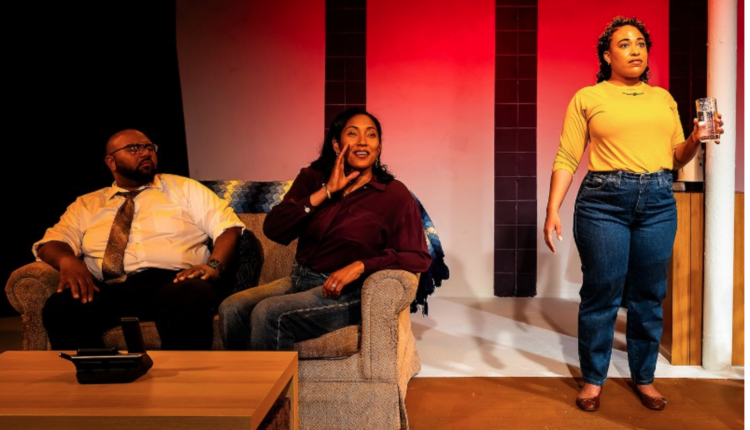“the ripple, the wave that carried me home” is at Theatre Nova, 410 West Huron Street, Ann Arbor, through April 14. Visit theatrenova.org for tickets and more info.
by Jenn McKee, Pulp
A social change agent who’s also a parent lives inside a paradox: Though they’re often driven by hopes of making the world a better place for their child, they must necessarily invest a vast amount of time and passion (that might otherwise be spent on the child) into their cause to even have a chance at moving the needle—and that child’s resentment can all-too-easily take root and grow.
This is one of the primary conflicts at the heart of Christina Anderson’s play the ripple, the wave that carried me home, now on stage at Theatre Nova. The 90-minute drama focuses on Janice (Bryana Hall), a woman living with her husband and sons in Ohio in 1992 as the L.A. riots—sparked by acquittals for the police officers who brutally beat Rodney King—unfold on television.
In this same moment, Janice’s past suddenly pulls on her by way of a series of phone calls from the hilariously named Young Chipper Ambitious Black Woman (Tayler Jones), who wants Janice to attend a ceremony back in her Kansas hometown, where a local pool will be dedicated in her father’s name.
But Janice’s feelings about this honor are complicated: Not only did her parents’ long, sustained fight to racially integrate local pools eventually become an embarrassment to her in her teenage years but it also led to a searing confrontation between Janice and her now-deceased father, Edwin (Jonathan Jones). Janice has no desire to revisit this painful chapter of her family’s history, and she knows the pool ceremony will bring everything back to the surface; but in the end, Janice can’t say “no,” either.
As the play’s title suggests, the script can sometimes veer into self-consciously poetic prose, particularly early on. Yet the more we get to see Janice’s family come to life in her memories—including her graceful swim instructor mom, Helen (Yolanda Davis), and her larger-than-life Aunt Gayle (Tayler Jones, doing double duty)—the more the ripple starts gaining depth and emotional traction.
Director Lynch Travis and his able cast make you feel like a fly on the wall of this family’s home, so we see them at their most endearing—dancing with each other, joking around, sharing memories—and their most vulnerably human.
Hall carries the biggest load, acting-wise, as she must play Janice at different ages, make these shifts instantly (and often), and also deliver connective narrative tissue between scenes. Davis, meanwhile, makes Helen a queenly, principled woman whose deeply proud of her father’s legacy of teaching local Black children to swim for free. Jonathan Jones projects a fierce rectitude as a man who’s witnessed racial politics playing out in local pools his whole life; and Tayler Jones is a scene-stealer, earning both laughs and sympathy in her two outsized roles.
Paul Taylor designed the production’s spare set, consisting of a few furniture pieces and a tiled backdrop that subtly resembles a pool. Jeff Alder’s lighting design plays a large role in indicating shifts in time and underscoring the emotional tone of each scene. Micha Mallett’s costume choices make sure our eye stays trained on the play’s guide, Janice, who wears yellow, while the others wear cooler tones (though it’s fitting that Aunt Gayle wears a print). And Briana O’Neal’s affecting sound design is the key to the show’s most heart-stopping moment.
By the show’s end, there were a couple of unresolved questions that gnawed at me. For instance, when Helen and Janice are driving home from what would be their last trip to a nearby town for a pre-dawn swim session, the police pull them over, and Helen is asked to get out of the car. In the next scene, in the family’s home, it’s clear that something traumatic happened to Helen, and Janice never swims again. But because we’re kept at arm’s length, left to fill in the blanks for ourselves, the impact is muted.
Similarly, Janice raises the question of why her mother, who worked alongside her father to integrate the local pools, doesn’t get to have her name on the pool, too. While the answer Young Chipper gives Janice is that her father, who eventually brought a legal suit, was the face of the campaign, it still feels like a question deserving of a deeper conversation in the text—maybe even a conversation between Janice and Helen that’s focused on this question.
But small quibbles aside, I found the ripple to be a thoughtful, engaging show—one that explores, from a Black perspective, the way racism does damage not just externally but internally as well. When Janice fights with her father, she tells him he should stop fighting white people, because he’ll never win; and despite Young Chipper’s relentless cheer, she’s stopped short when Janice asks about her workplace, and inquires if she’s “the only one.”
This is something we need no further context for. We know precisely what Janice means.
And even though the play ends with a moment of healing and renewal, the disarming passages that precede it temper the hope we so badly want to feel. Anderson doesn’t let us off the hook so easily—and rightfully so.


Comments are closed, but trackbacks and pingbacks are open.